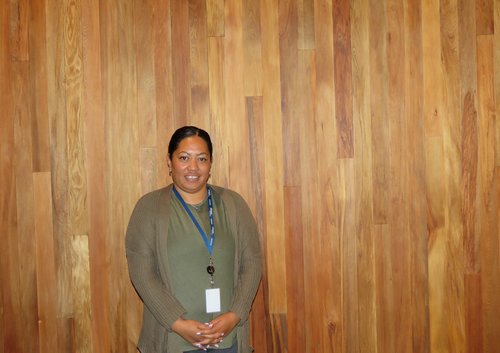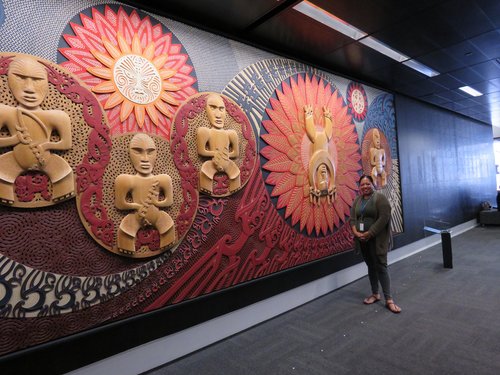
Ko Hikurangi te maunga
Ko Waiapu te awa
Ko Tu Au Au te tipuna whare
Ko Horouta te waka
Ko Apirana Ngata te tangata
Ko Ngāti Rangi te hapu
Ko Ngāti Porou te iwi
Pokai (Ngāti Porou and Te Aupōuri) has been interning at Ngā Taonga Sound & Vision for ten weeks and she sat down with David Klein to reflect on the work and the journey that led her here.
‘My love and passion will always be for the language,’ says Lady Pokai as we wait for our coffee to arrive in a Wellington café. This love has been with her as she’s learnt the language, written news bulletins for iwi radio and trained to become a te reo teacher. It was there, too, from her grandfather when she was growing up. ‘I do what I do because of him – we had a special relationship. He’s a big influence that shaped who I am today.’
Her grandfather, Teranga Pokai, was born in Reporua, but moved to Maramarua for a job at the meat works. ‘No matter where he went though, he still retained who he was and his cultural identity. He’s a Ngāti Porou man who was immersed in tikanga and whakapono Māori (Māori religious beliefs).’ Lady Pokai grew up with her grandparents in South Auckland and the family retained the links to the East Coast. ‘We travelled back two or three times a year. Sometimes there was an event; other times just for a holiday.’
It’s that connection to the coast that saw her selected to be one of three interns from Radio Ngāti Porou. The three were allocated to Archives New Zealand, the National Library of New Zealand and Ngā Taonga. Each of them spent ten weeks researching and cataloguing Ngāti Porou content held by each organisation.
‘Ten weeks – it’s just not long enough!’ laments Pokai who has been flat out working with material. ‘It’s great though, I’ve learnt so much. I’m listening out for content we might be able to play on Radio Ngāti Porou – archival material that speaks specifically to the language about the dialects of Ngāti Porou. I’m also looking for appropriate material to showcase for an upcoming Ngāti Porou exhibition. And I’m definitely finding some gold.’
Hero image: Lady Pokai. (Photo by David Klein)

Lady Pokai (Photo by David Klein)
Our coffees arrive and Pokai explains that alongside finding content, the research has been hugely beneficial to her own kete mātauranga. ‘I’ve learnt about our own kawa (protocols), why we do things the way we do on our marae in Ngāti Porou. Even down to the language, there are commonly used words within Ngāti Porou we don’t hear a lot today, like ‘whakakeke’, ‘taritari’ or ‘kohukohu’. There’s also our own unique whakataukī, proverbs.’ Gaining a better understanding of the Porou dialect helps Pokai with the internship mission of revitalising the mita.
Pokai’s work has involved listening to and watching archival material, adding information where possible and enriching the catalogue records. ‘There might be a whole lot of information that could be added to support the description. I’m doing that and trying to think about how people might be searching for things in 10, 20 or 30 years’ time.’ Her work on these collection items increases their accessibility.
An example is recordings from the 1990s of a Māori Congress Hui held in Invercargill. The entry describes representatives from different iwi coming together for a few days. The majority of the meeting is in te reo and Pokai’s expertise was able to expand the record. ‘I listened and was able to break down the different topics of the meeting. They talked about land issues, water rights and political issues.’ This insight enhances the catalogue listing.
Though Pokai is fluent in te reo, that wasn’t always the case. ‘I was brought up with my grandparents, but due to colonisation and the former native schools system, te reo wasn’t spoken at home,’ she explains. ‘It was spoken at tangi or unveilings – when all the elders were together. At home they’d growl us kids in Māori and you know it’s a bad growling if you have to translate it.’ Pokai picked up basic reo growing up, loved kapa haka and took School Certificate Māori. It wasn’t until she started working at an iwi radio station that things began to take off. ‘After starting my mahi at Te Upoko, a Māori radio station in Wellington, that’s where my love for the language really started to grow and blossom.’
She’s now based at Radio Waatea in Auckland, writing news reports in te reo. Having spent ten years in the Māori Broadcasting industry has been a huge privilege for Pokai. ‘Radio has helped me so much and I get to keep my ear to the ground for language around the country. “What’s happening over in Tainui, Taranaki, or Te Tai Tokerau?”’ Being able to listen to the way language is being used nationally is helpful for her language development. ‘Writing news bulletins, we’re trained to use the generic language.’
While this helps communicate to the widest audience, a standardised te reo is different from what’s used on the ground. Each hapū has differences in the way words are used and sentences are structured. This internship has provided Pokai with a great opportunity. ‘I’ve been able to watch lots of old recordings and listen to the way our elders used to speak 20 or 50 years ago. If you’re not learning the language or mita in Ngāti Porou, then the Ngā Taonga archives are definitely a valuable resource for this.’
We head back upstairs to the office and I think about how the past and the future are connected. Being able to access recordings of tīpuna from decades past absolutely has an effect on who you are and the choices you make. Pokai sits down at a viewing station and grabs a VHS tape. In the machine, it whirs and an image of Piripi Taumata-a-Kura comes on screen. ‘He was an important tipuna, one of our elders, ancestors,’ she explains. ‘He was an instrumental figure in our history who brought Christianity to Ngāti Porou.’
She goes on to talk about viewing film footage of another famous Porou son, Apirana Ngata. ‘I knew that he was a leader, he did so many amazing things not just for Māori but to bind the relationship between Māori and Pākehā. But it’s not until I watched a lot of archival material that you really see what he did and the effects that he had on the people.’
Whaia McClutchie was another tipuna Pokai found impressive. ‘I’m learning more and more about the type of person she was. She attended every kaupapa on the coast, a mover and shaker of the tribe: a real face of the people.’
Pokai is on a journey and I can tell that knowing where she’s from is important and informs where she’s going. ‘All of this is a way for me to give back to my people and for generations to come. It will help with the revitalisation of our dialect back home. I wanted to do this internship for my people, for te reo Māori and for its future.’
The love and importance she places on the language is undeniable and it’s exciting to hear about her future plans. ‘I’m in the final year of my teacher’s degree specialising in te reo Māori. My time here interning will definitely enhance my knowledge and skill in terms of having my own dialect and that will help in the way I teach te reo to the next generation,’ she reflects. ‘Te reo Māori is everything – it’s become my livelihood. This just feels like giving back to the world and to te ao Māori.’